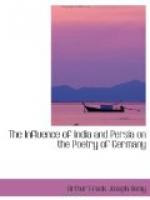[159] For Nidami I have used a lithographed edition published at Shiraz, A.H. 1312. In Wilberforce Clarke’s transl. of the Iskandar Namah, London, 1881, the couplet in question is the forty-third.
[160] Cf. for Persian text Garcin de Tassy, Mantic Uttair, Paris, 1863. Also French transl. p. 1 seq.
[161] See Jas. W. Redhouse, The Mesnevi of Mevlana (our Lord) Jelalu-d-din, Muhammed, er-Rumi, Lond. 1881, B. i. p. 19. For Rueckert’s source see Boxberger, op. cit. p. 224.
[162] See H. Ethe, Neupers. Litt. in Grdr. iran. Phil. vol. ii. p. 289.
[163] Wilh. Bacher, Nizamis Leben u. Werke, Leipz. 1871, p. 119 and n. 4.
[164] Memoires sur divers Antiquites de la Perse, et sur les Medailles des Rois de la dynastie des Sassanides, suivis de l’Histoire de cette Dynastie traduite du Persan de Mirkhond par A.I. Silv. de Sacy, Paris, 1793.
[165] Mohammedi Filii Chavendschahi vulgo Mirchondi Historia Samanidarum Pers. ed. Frid. Wilken, Goettingae, 1808.
Mohammedi Filii Chondschahi vulgo Mirchondi Historia Gasnevidarum Persice ed. Frid. Wilken, Berol. 1832.
Geschichte der Sultane aus dem Geschlechte Bujeh nach Mirchond, Wilken in Hist. philos. Abh. der kgl. Akad. d. Wissensch. zu Berlin, Berl. 1837. (This work from 1835.)
[166] Mirchonds Geschichte der Seldschuken, aus d. Pers. zum ersten Mal uebers. etc., Joh. Aug. Vullers, Giessen, 1837.
[167] A complete list of the portions of Mirchvand’s work edited and published by European scholars before 1837 may be found in Zenker’s Bibl. Orient., Nos. 871-881. Nos 874, 875 and 879 have not been accessible to me.
[168] A letter given by Boxberger in op. cit. p. 74 shows that Rueckert asked for the loan of this book.
[169] Histoire de Yemineddoula Mahmoud, tr. par A.I. Silv. de Sacy in Notices et Extraits des Manuscrits de la Bibl. Nat., tom. iv.
[170] For a similar form of the story see Gobineau, Histoire des Perses, Paris, 1869, vol. ii. pp. 9, 10, where the story is given on the authority of a Parsi work, the “Tjehar-e-Tjemen” (i.e. Cahar-i-Caman, “the four lawns").
[171] For the romance about this man see Th. Noeldeke, Tabari, pp. 474-478.
[172] Lithogr. ed., p. 23. See also Malcolm, op. cit. i. 196; Red. p. 107.
[173] Deguignes, Hist. Gen. des Huns, des Turcs, des Mogols, et des autres Tartares occidentaux, etc. Paris, 1756-1758, vol. ii. pp. 209, 223; Malcolm, op. cit. i. pp. 211, 218.
[174] See Elphinstone’s Hist. of India, Lond., 1841, vol. ii. pp. 10-12; also Elliot, The History of India as told by its own historians, Lond. 1867-1877, vol. ii. pp. 332-335, 337, where the story is not so romantic as in Rueckert’s poem.
[175] Taken from Red. p. 183, where it is given as from Rumi. See above, p. 6.
[176] Gesta Roman. ed. Herm. Oesterly. Berl. 1872, c. 167. For bibliography of this fable see W.A. Clouston, A Group of Eastern Romances, 1889, pp. 563-566, pp. 448-452.




